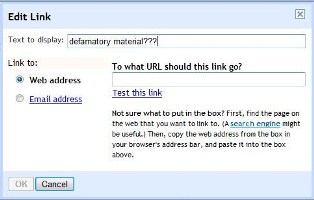
Canada's Supreme Court ruled that linking to defamation isn't the same as defamation.
Canada’s Supreme Court decided that linking to “defamatory material” isn’t defamation, CBC reported. .
As CBC explained, the decision was important because it could potentially have implicated social media users, bloggers, and Internet freedom of speech. The court made a “unanimous decision to dismiss the case,” according to CBC.
iMediaEthics wrote in April 2010 when the court agreed to hear the case. The case: Jon Newton’s 2006 story on his site p2pnet linked to defamatory articles about businessman Wayne Crookes. Crookes called for Newton to take the links out, but Newton said no. At that point, both a British Columbia district court and appeals court ruled that the links don’t count as re-publishing defamatory content.
One of the Supreme Court justices, Rosalie Abella, explained in the court’s ruling that:
“The internet cannot, in short, provide access to information without hyperlinks. Limiting their usefulness by subjecting them to the traditional publication rule would have the effect of seriously restricting the flow of information and, as a result, freedom of expression.”
Further, the ruling noted that making links defamatory couldn’t be fair because linkers can’t be expected to know if a link was changed.
The Supreme Court reminded that the defamatory article is the one plaintiffs should pursue, and not links to the defamation, according to CBC.
The allegedly defamatory information was published on Thunder Bay website. Thunder Bay’s Michael Pilling told the Globe and Mail that “This decision is a landmark for Canadian Internet law, in my opinion.” The Globe and Mail noted that Pilling is “still a defendant in a related action.”
Newton is quoted as telling the Vancouver Sun that he “honestly thought we would win in the end.” In a post on p2pnet, Newton commented that he “felt vindicated” by the ruling.
Courthouse News Service reported that “numerous groups served as interveners in the case.” According to USLegal.com, an intervenor “is a party who does not have a substantial and direct interest but has clearly ascertainable interests and perspectives essential to a judicial determination essential to a judicial determination.” For example, the Canadian Newspaper Association, the Writers’ Union of Canada, PEN Canada and the Canadian Publishers’ Council were among the intevenors.





Comments Terms and Conditions